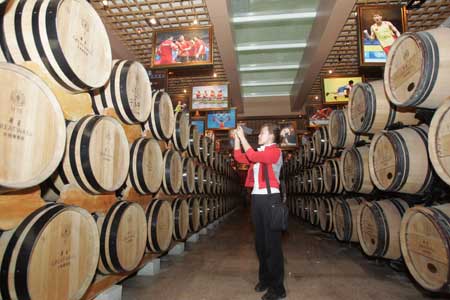Fake wine stuns nation
In the latest food scandal to rock China, six people were detained, more than a dozen corporate accounts were frozen and tainted wine bottles were pulled off shelves after red wine made in Changli county, Hebei Province, was found to have been both chemically altered and falsely labeled as a superior product.
 |
|
A woman tours a cellar of the Great Wall Wine production base in 2009 in Changli county, Hebei Province. |
The Jiahua, Yeli and Genghao wineries have been accused of forgery and of adulterating their wine, during investigations by the local government that shut down their operations, the Xinhua News Agency reported Sunday, adding that sixteen corporate accounts involving 2.83 million yuan ($427,000) were frozen.
A total of 5,114 boxes of wine, thought to have been falsely labeled, and 19 templates for forging brand labels, as well as 280 unlabeled bottles, were seized.
The county is famous for wine production, as it produces a third of China's domestic grape wine and has been nicknamed "China's Bordeaux."
Supermarkets in Beijing pulled the products off their shelves after the report.
"We are highly concerned about this behavior. To ensure safety measures, we have already started to remove the suspected wines from the shelves," Zhang Tao, spokesman for Walmart supermarkets in Beijing, Tianjin and Hebei, told the Global Times.
Fu Yun, who is in charge of liquor in Wu Mart in Beijing, told the Beijing Morning Post that they have already stopped selling the products and have asked manufacturers to provide test reports and new licenses.
Hefei, the provincial capital of Anhui Province, has also discovered hundreds of adulterated wine bottles from Changli county, according to the Anhui Business Daily.
Five wineries in Changli were suspected of making adulterated wines and labeling their products as famous brands, including the Great Wall Wine made by the China National Cereals, Oils & Foodstuffs Import & Export Corporation (COFCOA), CCTV reported Thursday.
CCTV's footage showed a local sales manager admitting that some wines made in the coastal city of Qinhuangdao contained only 20 percent of fermented grape juice, with the rest being composed of sugar water mixed with chemicals, including coloring agents and flavorings.
Jiahua, one of the three wineries shut down, was also found to use nothing but water and chemicals to make its wine, with the cheapest bottle selling for less than 10 yuan ($1.50) on the market.
According to a single receipt documenting the sales of the fake wine produced by Jiahua, 8,000 bottles of wine were sold to one buyer in Beijing in one day. CCTV claimed that Jiahua sold about 2.4 million bottles of this wine each year.
 0
0 






